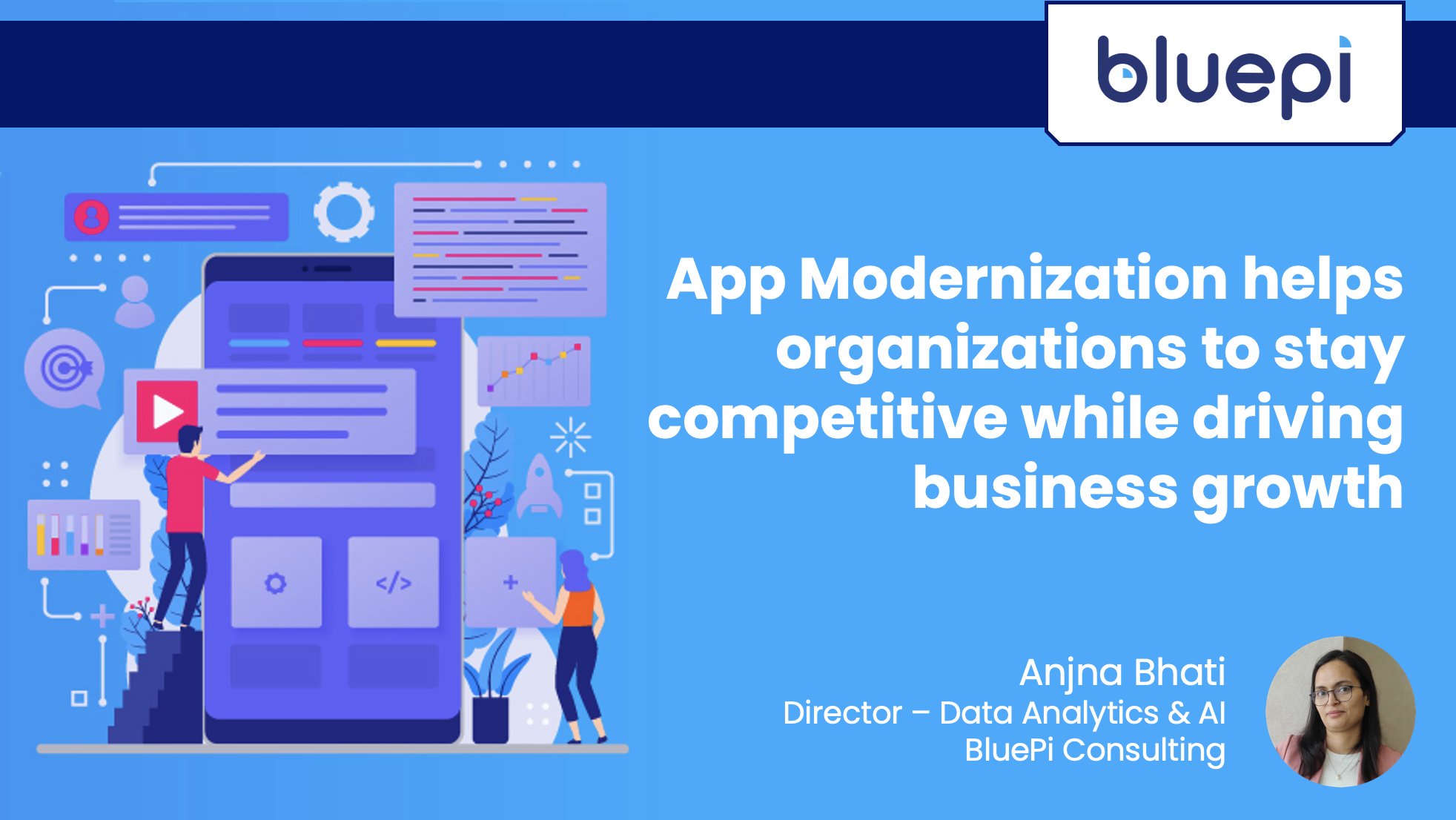App Modernization helps organizations to stay competitive while driving business growth - Ms Anjna Bhati, CTO, BluePi Consulting

Organizations of all sizes execute several business development strategies to establish themselves and earn a significant market share to stay ahead of the curve. Achieving this status is not an easy task if organizations do not evolve and adopt new business models by leveraging new technologies. Today’s customers across the globe are present online more than before and want access to services 24/7X365 days. Organizations will be in a position to offer that only when they modernize their outdated and legacy systems.
Aging systems are incompatible with new technologies, pose security risks, and are not flexible and scalable, and without getting updated, businesses cannot grow exponentially in today’s hypercompetitive world. The majority of the legacy systems are not flexible and scalable due to their monolithic architecture. Due to this organizations are unable to innovate and adopt the latest trends. Legacy or Application (App) modernization involves updating old software to leverage new tools, frameworks, languages, and architecture, thereby extending its lifespan. Some of the technologies involved in the app modernization process are Cloud Computing, Containerization, Kubernetes, Microservices, Serverless, Orchestration, and Automation among others. Moreover, to leverage the full potential of cloud services and its microservices architecture it is necessary to modernize legacy applications.
Key business benefits with app modernization
As we understand why app modernization is important, let us take a closer look at the business benefits it offers.
Cost reduction
and efficient management of IT Budgets
While we anticipate more layoffs and budget cuts, organizations have no choice but to prepare for the oncoming recession by cutting costs. One of the ways to do this is by app modernization, as massive amounts of cash are spent on operating and maintaining legacy systems. These outdated applications require very large data storage capabilities in on-premise data centers and a team with special skills needs to be deployed to maintain these outdated legacy systems, incurring more costs. Modernizing the systems can lead to a significant reduction in the IT infrastructure costs.
Faster-go-to-market
is possible
Legacy systems are not flexible enough to accommodate new features even by leveraging new technologies. When the operations are not efficient enough, then addressing the challenges of the users is almost impossible. On the other hand, it is easier to add new features to a modernized system by leveraging a new tech stack in a scalable environment, thereby reducing the go-to-market time. Businesses can get more innovative and respond to new market opportunities and engage with customers more meaningfully.
Improved
customer experience
Today’s customers expect a better experience than in the past with the incorporation of the latest technologies and trends. As new features are created, manual processes are automated and the user interface is transformed, the customer experience gets better. App modernization gives rise to user-friendly apps, which can be integrated into customer service bots, thus catering to the evolving customer demand. With the modernization of applications and the additional functionality that comes is far better and can act as a differentiator.
Increases
employee collaboration and productivity
Modernization reduces manual effort and time by leveraging Automation, with repetitive tasks taken care of, leading to a significant increase in productivity. Employees are freed now to focus on the higher-end tasks, which is their core objective. New designs that are now created enable streamlining of operations bringing efficiency into the processes. New-age communication and collaboration tools with app modernization undoubtedly improve team productivity as they work together more efficiently. This is not possible with the use of legacy systems where employees experience delays and have to wait for long to get a response or perform a simple operation.
Security
vulnerabilities are eliminated
Legacy systems are an easy target for cybercriminals. New security measures such as multi-factor authentication cannot be used with legacy applications, posing a risk to the organization’s cybersecurity posture. But by modernizing apps to a secure and high-performing platform, the chances of data or system compromise are considerably reduced. By modernizing and securing their businesses with adequate access controls, the risk of a security breach is greatly lowered, security vulnerabilities get eliminated and the organization’s security posture gets enhanced.
The several benefits offered by App Modernization are driving the growth of this market. According to Markets and Markets, the App Modernization Services market size is expected to grow from USD 15.2 billion in 2022 to USD 32.8 billion by 2027 at a CAGR of 16.7%, during the forecast period.
With the significant reduction in
infrastructure costs, an increase in efficiency and automation, app
modernization leads to significant savings in time too. Organizations now have more time to focus on
innovation and market reach, contributing to higher revenues and fueling
business growth. In today’s competitive
business and technology landscape, app modernization helps organizations stay
ahead of the curve by unlocking the full potential of their IT infrastructure.



